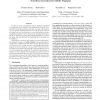Free Online Productivity Tools
i2Speak
i2Symbol
i2OCR
iTex2Img
iWeb2Print
iWeb2Shot
i2Type
iPdf2Split
iPdf2Merge
i2Bopomofo
i2Arabic
i2Style
i2Image
i2PDF
iLatex2Rtf
Sci2ools
ASPLOS
1998
ACM
1998
ACM
Overlapping Execution with Transfer Using Non-Strict Execution for Mobile Programs
In order to execute a program on a remote computer, it must first be transferred over a network. This transmission incurs the overhead of network latency before execution can begin. This latency can vary greatly depending upon the size of the program, where it is located (e.g., on a local network or across the Internet), and the bandwidth available to retrieve the program. Existing technologies, like Java, require that a file be fully transferred before it can start executing. For large files and low bandwidth lines, this delay can be significant. In this paper we propose and evaluate a non-strict form of mobile program execution. A mobile program is any program that is transferred to a different machine and executed. The goal of nonstrict execution is to overlap execution with transfer, allowing the program to start executing as soon as possible. Non-strict execution allows a procedure in the program to start executing as soon as its code and data have transferred. To enable this...
ASPLOS 1998 | Low Bandwidth Lines | Mobile Program Execution | Nonstrict Execution | Programming Languages |
Related Content
| Added | 05 Aug 2010 |
| Updated | 05 Aug 2010 |
| Type | Conference |
| Year | 1998 |
| Where | ASPLOS |
| Authors | Chandra Krintz, Brad Calder, Han Bok Lee, Benjamin G. Zorn |
Comments (0)

